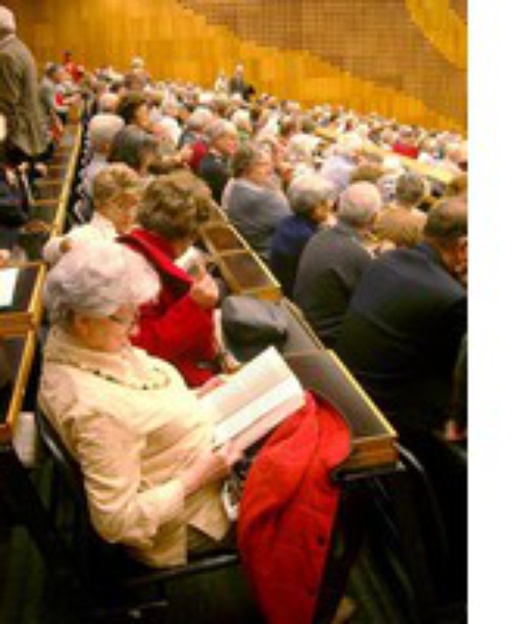Old, lonely and bored? Far from it!
Published on
Translation by:
 luke kroll
luke kroll
Contrary to the opinion that young people are the kings and queens of the 21st century, the future belongs to retirees. Nowadays, there are more and more senior citizens making their dreams a reality
“I don’t know if there is a universal measuring system to define the moment when someone becomes old. However, the term often refers to a retired person aged over 60. I look around me and I’m trying to find out if it’s the time for collapse or the start of a carefree life,” explains Krzysztof Zanussi, a 67-year-old Polish filmmaker.
Life begins at 60
Given the diversity of current retirees, it’s hard to define when old age begins. Some people carry on working, such as Riccardo Bertani, a 75-year-old Italian expert in the languages and traditions of central Asia, who is about to produce a new Italian-Mongolian dictionary. According to a study in 2004-5 by the Mannheim Research Institute for the Economics of Ageing (MEA), in Switzerland, Sweden, Denmark and the UK employment rates for 55-64 year olds passed 50%. In France, it is scarcely more than 30%. The lifespans of some of Europe’s citizens is increasing while they are still retiring early.
The early retirement age allows the pensioners of Europe to explore other activties. Besides work, a lot of those over 50 spend time helping their friends and caring for ill dependents (23%), and on social or religious activies (10%). Some enjoy playing different sports, going on organised holidays, going to university or working for associations. As a general rule, it is usually money and health that determine how they spend their free time.
 “American retirees worry about the temperature of the water in their swimming pools, German retirees complain about the price of holidays in hot countries, but elderly people in Poland are really blazing a trail. They have their own radio station, government minister and president. They are one of the most dynamic social groups in Poland and that’s why I admire them. I even wrote a song in their honour called Mohair berets,” said Krzysztof Skiba, the lead singer of Polish group Bic Cyc (‘The Big Tit’) in an interview. The victory of the Polish Law and Justice Party (PiS) in the last elections was largely thanks to senior citizens, who have often been won over by the ultra-Catholic and conservative Maryja radio station.
“American retirees worry about the temperature of the water in their swimming pools, German retirees complain about the price of holidays in hot countries, but elderly people in Poland are really blazing a trail. They have their own radio station, government minister and president. They are one of the most dynamic social groups in Poland and that’s why I admire them. I even wrote a song in their honour called Mohair berets,” said Krzysztof Skiba, the lead singer of Polish group Bic Cyc (‘The Big Tit’) in an interview. The victory of the Polish Law and Justice Party (PiS) in the last elections was largely thanks to senior citizens, who have often been won over by the ultra-Catholic and conservative Maryja radio station.
Sport and university, betting on health
In Europe, there are hundreds of new ‘third-age’ universities which give senior citizens the chance to make their youthful dreams a reality, dreams which in the past may have been impossible to reconcile with starting working life and family responsibilities. These establishments meet a growing demand and pride themselves on increasing the mental activity of the oldest members of society. “Even the teachers tell us that they prefer to teach here because the pupils are more motivated than young students, more inclined to knuckle down,” says Jeannine Pasche of the Inter-Age University in Créteil. There are no exams, nor entry requirements or degree certificates: these particular students go to class for the simple pleasure of learning.
There are 1471 students enrolled in this university, with a 93-year-old the oldest. There are classes from October to June, costing 168 euros for a year’s study. The highest demand is for courses in languages, since they allow group travel, but there is also a lot of interest in art history. “Absenteeism is usually for health reasons, but it’s very low, because these senior citizens usually come to build a new social life for themselves,” continues Jeannine Pasche. “I’m finally making my dreams a reality: I’ve always wanted to draw and now I don’t have any professional commitments,” says Aleksandra Orgorzalek, a student at the Third Age University in Lodz.
Studies or sports - that’s the question. Today, no-one is surprised to see a grandfather riding a bike. “I’ve got a car, but when I’ve got the time and the chance, I ride my bike for fun and my health,” says Roman, an energetic and smiling 82-year-old, who is the vice-president of the Polish War Veterans foundation. Keeping an eye on one’s welfare and physical condition is particularly widespread amongst Western Europeans.
 Mia Spierdijk, 74, is Dutch and plays golf regularly. “I do the full 18 holes and it does me good to walk around in the open air for 7 kilometres, three times a week.” This modern grandma sends texts to her grandson who is training abroad, organises meetings by email and surfs the web to find out the weather forecast or read the foreign newspapers. “I’ve got the same mentality that I had when I was 25. The only difference now is that I get tired a bit more quickly,” she notes. Even so, at 70 years old, a Japanese man, Takao Arayama, succeeded in conquering Everest!
Mia Spierdijk, 74, is Dutch and plays golf regularly. “I do the full 18 holes and it does me good to walk around in the open air for 7 kilometres, three times a week.” This modern grandma sends texts to her grandson who is training abroad, organises meetings by email and surfs the web to find out the weather forecast or read the foreign newspapers. “I’ve got the same mentality that I had when I was 25. The only difference now is that I get tired a bit more quickly,” she notes. Even so, at 70 years old, a Japanese man, Takao Arayama, succeeded in conquering Everest!
Nevertheless, it isn’t all the old who have these Olympic capabilities. While the report by the MEA shows that the senior citizens of Northern Europe are in better health than those of the South, this does not translate itself into mortality rates. Despite the growing life expectancy around Europe, there are still problems. The French drink more alcohol than any others (40% drink more than two glasses a day), while 60% percent of the Spanish population over 80 suffer from depression.
Delayed fame?
For some time now, some Polish clothing chains have been holding fashion shows, in which the models are women over 60. Despite, or even thanks to their age, they are not afraid of extravagance or ridicule and they love the different experiences. Krystyna, one of the group’s members, says that she “has got rid of her complexes since getting old and only wearing slippers and using rocking chairs.” How’s that for an original point of view?
Photographic copyright: Jacques Erard, of the Université du Troisième Age de Geneve (second photograph) and Mia Spierdijk (third photograph).
Translated from Wesołe jest życie staruszka!


